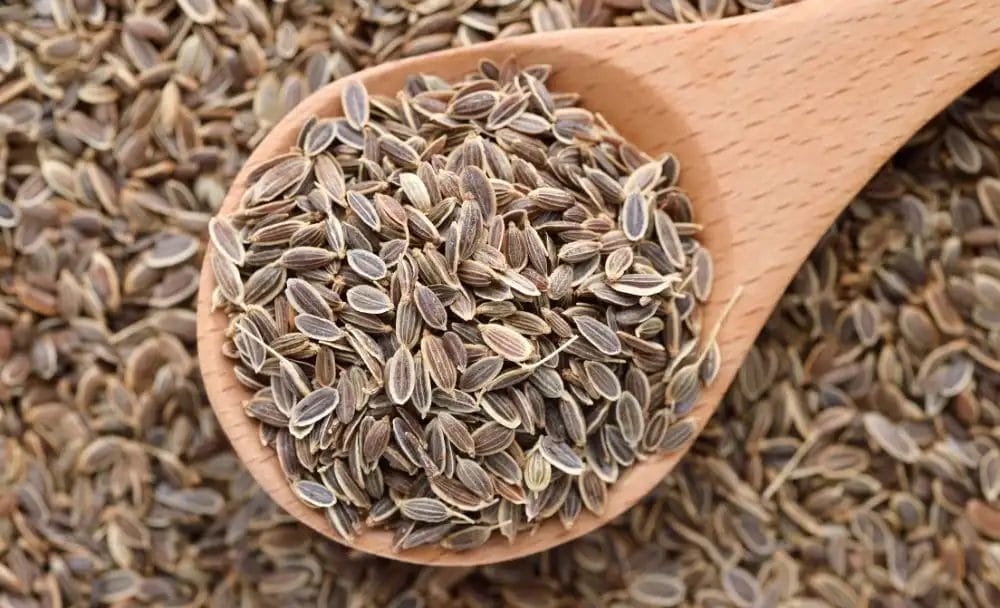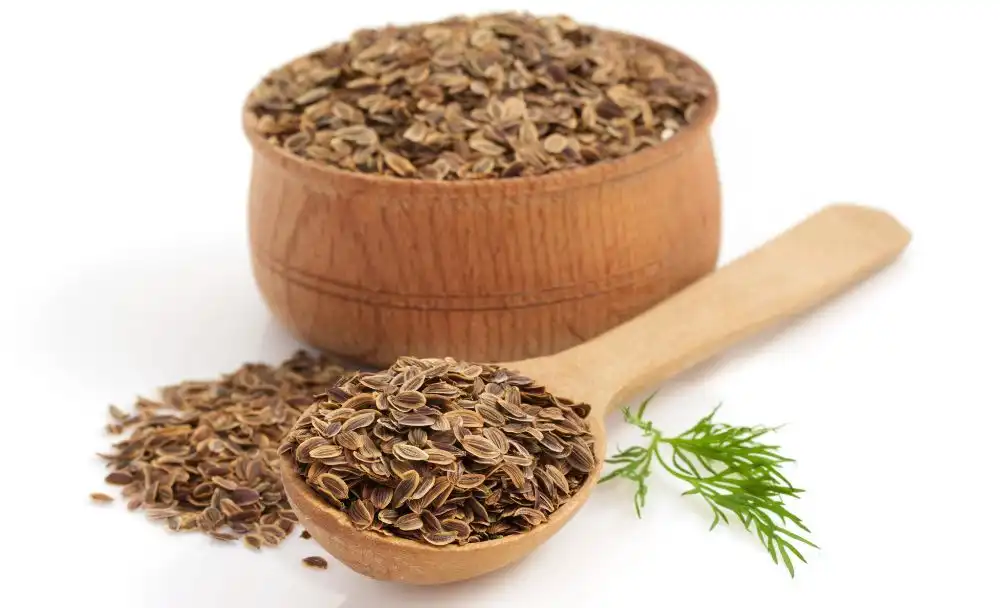This article is reviewed by an expert

Dill is a popular culinary herb that belongs to the Apiaceae family. It is better known across most of India as Sowa or Savaa and is referred to in Ayurveda as Shatapushpa. With their mild, yet distinctive flavour, dill leaves are often used as a garnish, added to salads, soups, and sauces, and can be used to flavour fish, potatoes, and vegetables. Dill seeds are just as important and the entire herb has long been used in Ayurvedic medicine. The seeds are often used as a spice and have a stronger flavour as compared to the leaves.
Dill Leaves Seeds Properties 1
| Rasa | Virya | Vipaka | Gunas |
| Katu Tikta | Usna | Katu | Laghu, Tiksna and Snigdha |
Dill Seeds Benefits
- Digestive Health
Dill and dill seeds have been traditionally used to aid digestion. They may help reduce bloating, gas, and indigestion. Dill contains compounds that can stimulate the secretion of digestive juices and enzymes, promoting better digestion.
- Antioxidant Properties
Dill contains antioxidants, such as flavonoids, terpenoids and tannins, which can help neutralize harmful free radicals in the body and reduce oxidative stress, thereby supporting overall health 2.
- Anti-Inflammatory Effects
Dill has anti-inflammatory properties that may help reduce inflammation and offer relief from inflammatory conditions, lowering the risk of chronic conditions linked to systemic inflammation.
- Cardiovascular Benefits
A reduction in systemic inflammation is known to lower the risk of heart disease. Additionally, studies show that dill can improve other parameters that influence heart disease risk such as cholesterol and lipid levels 3.
- Immune Support
Dill is regarded as a healthy addition to one’s diet as it contains a good amount of vitamins A and C, both of which are essential for a healthy immune system 4,5.
- Diabetes Control
Dill may offer benefits to individuals with diabetes or prediabetes as research shows that its daily intake can improve blood sugar regulation 6.
- Bone Health
Dill is a source of calcium and also contains minerals such as magnesium and phosphorus. All of these nutrients are important for maintaining strong bones and teeth, making dill useful for supporting musculoskeletal health 7.
- Cancer Protection
Dill is a rich source of naturally occurring plant compounds called terpenes, including d-limonene, which may lower the risk of cancer 8.
- Respiratory Health
Although clinical evidence is limited, Dill has long been used as a remedy for respiratory issues. It may help soothe coughs, reduce congestion and act as an expectorant.
- Sleep Aid
Some people believe that dill’s calming properties can help improve sleep quality and alleviate insomnia, but there have been no studies to confirm these benefits

Dill Seed Uses
Here are some tips and suggestions on how to use and enjoy dill seeds benefits:
- Salads: Sprinkle chopped fresh dill leaves over your salads for an added burst of flavour and aroma. Dill pairs particularly well with cucumber, tomatoes and yogurt-based dressings.
- Soups and Stews: Add fresh dill leaves to your soups or stews towards the end of cooking to infuse them with the herb’s distinctive taste. Dill works well in potato soup, fish chowder, and vegetable-based broths.
- Pickling: Use dill seeds in pickling recipes to enhance the flavour of pickled vegetables like cucumbers, carrots and green beans.
- Potatoes: Sprinkle chopped fresh dill leaves over boiled or roasted potatoes for a tasty and aromatic side dish.
- Dips and Sauces: Add chopped dill leaves to yogurt-based dips or sour cream-based sauces to create a refreshing and delicious accompaniment for vegetables or pita bread.
- Breads and Pastries: Incorporate dill seeds into bread dough or pastry recipes for a unique twist on traditional baked goods. Dill seeds work particularly well in savoury breads and biscuits.
- Raitas: Dill can also be added as garnishing to different types of raita, including raitas prepared with roasted and pureed brinjal, boondi or mixed vegetables.
- Infused Water: Create a refreshing infused water by adding some fresh dill leaves and cucumber slices to a pitcher of water. Let it sit in the refrigerator for a few hours before serving.
Remember that dill has a delicate flavour, so it’s best to add it towards the end of the cooking process or use it fresh as a garnish to preserve its aroma and taste.
Dill Seed Side Effects
Dill is regarded as largely safe when used as a culinary ingredient in part of a balanced diet. However, in rare cases it can have some side effects including 9:
- Allergic reactions in some people who are sensitive to plants in the same family, such as celery, carrot and parsley.
- They may interact with some medications that affect blood clotting, blood sugar, or blood pressure, such as warfarin, insulin, or antihypertensive drugs.
- They may not be safe for pregnant or breastfeeding women, as they may affect the menstrual cycle or milk production. There is not enough evidence to confirm their safety or efficacy for these groups
FAQs
Where does dill come from?
Dill is not considered native to India and originally came from Europe and North Africa, but there is a regional variant – Indian dill (Anetheum sowa) that grows in Northern India.
Are dill leaves or dill seeds better?
Both parts of dill are regarded as healthy and they have few differences in terms of nutrition and benefits. The seeds are preferred in medicinal uses because of slightly higher potency.
Can you eat dill raw without cooking?
Yes, dill can be eaten raw, but it should be washed thoroughly to avoid infections that can be caused by food contamination.
Conclusion
For culinary use, incorporating fresh or dried dill leaves and dill seeds into your diet is generally safe, and there is no specific dosage advice. Enjoying dill in moderate amounts as part of a varied diet can contribute to its potential health benefits. However, if you have any specific health concerns or conditions, it’s best to consult with a healthcare professional before making significant changes to your diet or supplement regimen.
Disclaimer: The information provided here is for general information and not meant to substitute any medical advice. Please consult your doctor for appropriate medical consultation.
References:
- https://www.ncbi.nlm.nih.gov/pmc/articles/PMC3249919/
- https://www.jstage.jst.go.jp/article/jos/67/12/67_ess18134/_article
- https://www.ncbi.nlm.nih.gov/pmc/articles/PMC4235097/
- https://www.ncbi.nlm.nih.gov/pmc/articles/PMC6162863/
- https://www.mdpi.com/2072-6643/9/11/1211
- https://www.ncbi.nlm.nih.gov/pmc/articles/PMC5088306/
- https://www.ncbi.nlm.nih.gov/pmc/articles/PMC3330619/
- https://www.ncbi.nlm.nih.gov/pmc/articles/PMC5894671/
- https://www.sciencedirect.com/science/article/abs/pii/S1081120610625239












